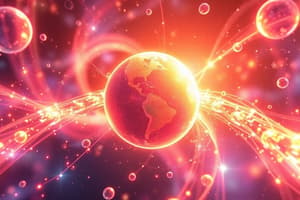Podcast
Questions and Answers
What is the primary composition of gases according to the kinetic theory of gases?
What is the primary composition of gases according to the kinetic theory of gases?
- Atoms or molecules with negligible size (correct)
- Liquids with high viscosity
- Solid particles with no intermolecular forces
- Particles with significant size
What happens to the kinetic energy of gas particles during collisions with the container walls?
What happens to the kinetic energy of gas particles during collisions with the container walls?
- It increases
- It is lost
- It remains constant (correct)
- It decreases
What is the relationship between temperature and kinetic energy of gas particles?
What is the relationship between temperature and kinetic energy of gas particles?
- Temperature is directly proportional to kinetic energy (correct)
- Temperature is inversely proportional to kinetic energy
- Temperature is equal to kinetic energy
- Temperature is unrelated to kinetic energy
What is the primary difference between ideal gases and real gases?
What is the primary difference between ideal gases and real gases?
What is the measure of the number of collisions of gas particles with each other and with the container walls?
What is the measure of the number of collisions of gas particles with each other and with the container walls?
What is the result of sufficient cooling of a gas?
What is the result of sufficient cooling of a gas?
What is assumed about the speed of particles in ideal gases?
What is assumed about the speed of particles in ideal gases?
What is the primary focus of the gas laws?
What is the primary focus of the gas laws?
What is the main characteristic of the particles in an ideal gas?
What is the main characteristic of the particles in an ideal gas?
Under what conditions do real gases deviate from ideal gas behavior?
Under what conditions do real gases deviate from ideal gas behavior?
What is the effect of increased collision frequency on the pressure of a gas?
What is the effect of increased collision frequency on the pressure of a gas?
What is the result of significant intermolecular attractions in a gas?
What is the result of significant intermolecular attractions in a gas?
What happens to the kinetic energy of gas molecules at low temperatures?
What happens to the kinetic energy of gas molecules at low temperatures?
What may occur when the temperature drops low enough or the pressure becomes sufficiently high?
What may occur when the temperature drops low enough or the pressure becomes sufficiently high?
What is the main assumption of the kinetic theory of gases regarding the size of particles?
What is the main assumption of the kinetic theory of gases regarding the size of particles?
What happens to the temperature of a gas when its kinetic energy increases?
What happens to the temperature of a gas when its kinetic energy increases?
Which of the following is a characteristic of ideal gases?
Which of the following is a characteristic of ideal gases?
What is the result of the weak attractive forces between gas particles?
What is the result of the weak attractive forces between gas particles?
What is the primary factor that affects the pressure of a gas?
What is the primary factor that affects the pressure of a gas?
What is the definition of kinetic energy in the context of the kinetic theory of gases?
What is the definition of kinetic energy in the context of the kinetic theory of gases?
What is the main difference between the kinetic theory of matter and the kinetic theory of gases?
What is the main difference between the kinetic theory of matter and the kinetic theory of gases?
What is the relationship between the average kinetic energy of gas particles and the temperature of the gas?
What is the relationship between the average kinetic energy of gas particles and the temperature of the gas?
What is the primary reason for the deviation of real gases from ideal gas behavior at high pressures?
What is the primary reason for the deviation of real gases from ideal gas behavior at high pressures?
What is the effect of intermolecular attractions on the pressure of a real gas?
What is the effect of intermolecular attractions on the pressure of a real gas?
What is the result of the compression of gas molecules at high pressures?
What is the result of the compression of gas molecules at high pressures?
What is the primary reason for the assumption of zero volume of particles in ideal gases?
What is the primary reason for the assumption of zero volume of particles in ideal gases?
What is the result of the decrease in kinetic energy of gas molecules at low temperatures?
What is the result of the decrease in kinetic energy of gas molecules at low temperatures?
Why do real gases deviate from ideal gas behavior at low temperatures?
Why do real gases deviate from ideal gas behavior at low temperatures?
What is the primary factor contributing to the significant volume of gas molecules at high pressures?
What is the primary factor contributing to the significant volume of gas molecules at high pressures?
What is the effect of reduced kinetic energy of gas molecules at low temperatures?
What is the effect of reduced kinetic energy of gas molecules at low temperatures?
What is the result of the increased collision frequency due to the compression of gas molecules at high pressures?
What is the result of the increased collision frequency due to the compression of gas molecules at high pressures?
What is the primary reason for the deviation of real gases from ideal gas behavior at low temperatures?
What is the primary reason for the deviation of real gases from ideal gas behavior at low temperatures?
What is the effect of intermolecular forces on the movement of gas molecules at low temperatures?
What is the effect of intermolecular forces on the movement of gas molecules at low temperatures?
What is the result of the compression of gas molecules at high pressures on the space available for movement?
What is the result of the compression of gas molecules at high pressures on the space available for movement?
Which assumption of the kinetic theory of gases does not directly relate to the properties of the gas particles themselves?
Which assumption of the kinetic theory of gases does not directly relate to the properties of the gas particles themselves?
What is the primary difference between real gases and ideal gases in terms of particle speed?
What is the primary difference between real gases and ideal gases in terms of particle speed?
Which of the following statements is true about the kinetic theory of gases?
Which of the following statements is true about the kinetic theory of gases?
What is the primary reason for the deviation of real gases from ideal gas behavior?
What is the primary reason for the deviation of real gases from ideal gas behavior?
Which of the following is a consequence of increasing the temperature of a gas?
Which of the following is a consequence of increasing the temperature of a gas?
What is the primary factor that determines the pressure of an ideal gas?
What is the primary factor that determines the pressure of an ideal gas?
Which of the following is a characteristic of the kinetic theory of matter?
Which of the following is a characteristic of the kinetic theory of matter?
What is the primary reason for the assumption of negligible particle size in the kinetic theory of gases?
What is the primary reason for the assumption of negligible particle size in the kinetic theory of gases?




